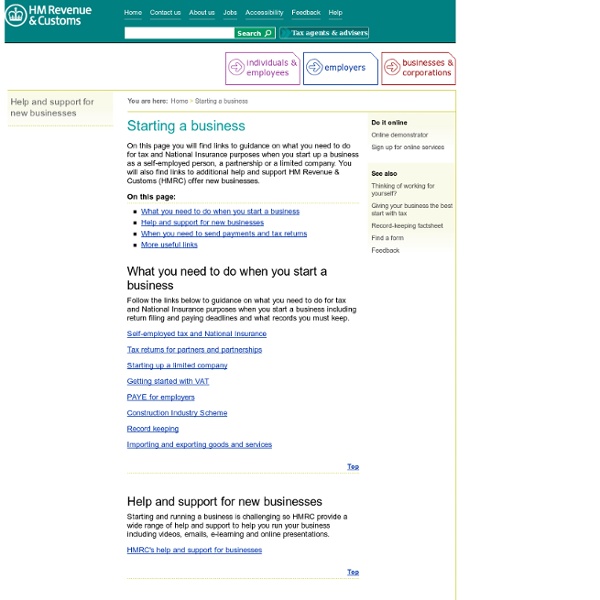VAT registration
You must register for VAT with HM Revenue and Customs (HMRC) if your business turnover is more than £81,000. You can register voluntarily if it’s below this, unless everything you sell is exempt. When you register, you’ll be sent a VAT registration certificate. your VAT number when to submit your first VAT Return and payment your ‘effective date of registration’ - this is the date you went over the threshold, or the date you asked to register if it was voluntary Your VAT responsibilities From the effective date of registration you must: charge the right amount of VAT pay any VAT due to HMRC submit VAT Returns keep VAT records and a VAT account You can also reclaim the VAT you’ve paid on certain purchases made before you registered. While you wait You can’t charge or show VAT on your invoices until you get your VAT number. You should increase your prices to allow for this and tell your customers why.
StartUp Britain: a living market-place for the wide range of enterprise support available on the web.
Five Great Startup Tips From Successful Entrepreneurs
NI - The Basics
You pay National Insurance contributions to build up your entitlement to certain state benefits, including the State Pension. The contributions you pay depend on how much you earn and whether you're employed or self-employed. You stop paying National Insurance contributions when you reach State Pension age. On this page: Who pays National Insurance? You pay National Insurance contributions if you're an employee or self-employed and you're aged 16 and over, as long as your earnings are more than a certain level. State Pension age is 65 for men born before 6 December 1953 and 60 for women born before 6 April 1950. Some people also pay voluntary National Insurance contributions. aren't working and are not claiming state benefits haven't paid enough National Insurance contributions in a year to count for the State Pension or other long term state benefits live abroad and want to maintain your state benefits entitlement Find out about to changes to the State Pension age (Opens new window) Top
Guidance - incorporation and names (GP1)
June 2013 - Version 5.1 as modified by the Companies Act 2006 PDF version of this page (814KB) Is this guidance for you? This guide will be relevant to you if: you want to incorporate a company you want to check which names are acceptable for a company Contents This guide answers many frequently asked questions and provides information on completing the most commonly used filings relating to this area. Introduction This guide sets out the main requirements for incorporating a company in the United Kingdom i.e. how to incorporate a limited company the type of company you wish to incorporate the company's officers choosing a company name including controls and restrictions disclosure of company name and other information Chapter 1 - Incorporating a new company 1. Incorporation is the process by which a new or existing business registers as a limited company. A business cannot operate as a limited company until it has been incorporated at Companies House under the Companies Act 2006. 2. 3. 4. 5.
Education | Can you teach entrepreneurship?
Can you teach someone to be the next Henry Ford or Richard Branson? Is business enterprise in your genes or can it be taught in the classroom? The government clearly believes that enterprise should be on the school curriculum. In the recent Budget, Gordon Brown announced a further £180m over three years to continue funding for enterprise education in the UK. That's about £17,000 a year for each average size secondary school. The scheme has been running for several years, yet many schools are still scratching their collective scalp, trying to work out just what enterprise education involves. Kitchen success Well, I've just met one young man who is well placed to tell them. Fraser Doherty is only 18 and completing his first year of a business studies degree at Strathclyde University. He has found success through jamming - no, not the musical variety, common enough amongst students, but the fruit-based version. Something had to give. Schooling 'Take risks' So what are schools supposed to teach?
Income Tax allowances
On this page: Top The Personal Allowance reduces where the income is above £100,000 - by £1 for every £2 of income above the £100,000 limit. Income Tax rates, allowances and tax bands for 2008-09 to 2010-11 (Opens new window) Income Tax rates and taxable bands * The 10 per cent starting rate applies to savings income only. The rates available for dividends are the 10 per cent ordinary rate, the 32.5 per cent dividend upper rate and the dividend additional rate of 42.5 per cent (the dividend additional rate is 37.5 per cent from 2013-14). More useful links Find out more about Personal Allowance Find out more about Income Tax Introduction to tax allowances and reliefs Taxable and non-taxable income at a glance
Governance and Leadership
Charities are generally governed by a trustee board that takes overall responsibility for its work. Governance is a term used to describe the trustees’ role in: the long term direction of the charity, including its objectives or purposes implementing policies and activities to achieve objectivescomplying with legal requirements accountability to those with an interest or 'stake' in the charity Good governance should happen throughout a charity. Our resources Our resources support and enable good governance and effective leadership in the voluntary sector. KnowHow Nonprofit KnowHow Nonprofit is our main advice and support website and the ‘go to’ place for social learning in the voluntary sector. View our governance resources on Knowhow Nonprofit. Studyzone video training courses StudyZone is the video training platform of the voluntary sector. How-to guides How-tos are practical, step-by-step guides written by our KnowHow community. Bespoke support on governance Trusted partners



